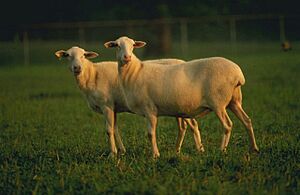St. Croix sheep facts for kids
The St. Croix (say "Saint Croy") is a special type of domestic sheep. These sheep come from the U.S. Virgin Islands, a group of islands in the Caribbean Sea. They are named after the island of Saint Croix. People sometimes call them "Virgin Island White" sheep. This is because the ones brought to North America were often chosen for their white color. However, on their home island, you can find them in shades of brown, white, and black.
St. Croix sheep are thought to be related to African sheep. These sheep were brought to the Caribbean a long time ago. What makes them unique is that they are "hair sheep." This means they grow hair instead of thick wool, so they don't need to be shorn (have their wool cut off). They are very tough and can live in warm, wet places. They are also known for being resistant to many common sheep problems, like parasites. Farmers mostly raise St. Croix sheep for their meat. Their strong traits make them a good choice for breeding with other sheep. They are even the base breed for other sheep types like Katahdin and Royal White sheep.
Contents
What Do St. Croix Sheep Look Like?
Most St. Croix sheep are completely white. But you can also find them in solid tan, brown, or black. Some are white with brown or black spots. Both the female sheep (ewes) and the male sheep (rams) do not have horns. Rams often have a big, fluffy ruff of hair around their throats.
Adult ewes usually weigh about 68 kilograms (150 pounds). Rams are heavier, weighing around 90 kilograms (200 pounds). When lambs are born, they weigh about 2.7 to 3.1 kilograms (6 to 7 pounds). A cool fact about St. Croix sheep is that their tails usually don't need to be cut short, which is common for many other sheep breeds.
How Do St. Croix Sheep Adapt to Their Environment?
St. Croix sheep are amazing at living in many different places. They are perfect for the hot, humid weather of the tropics. But they can also do well in cold temperatures! Their hair coat helps them stay cool when it's hot. In winter, they grow a thicker coat to keep warm. This coat also helps water run off, keeping them dry.
These sheep are sometimes called "Parasitic Pasture Vacuums." This is because they are very good at resisting parasites that live in pastures. This means farmers don't need to give them as much medicine to fight off worms. This special ability can be passed on to other sheep breeds when St. Croix sheep are crossbred. This helps create healthier sheep that are better at fighting off parasites on their own. St. Croix sheep are also good at resisting a foot problem called hoof rot. Because their hair sheds, they are also less likely to get bothered by flies that lay eggs in their coats.
Reproduction and Lambs
St. Croix sheep can start having babies at a young age. Both ewes and rams can become parents when they are just over 3 months old. To prevent very young ewes from getting pregnant too soon, lambs are usually separated from their mothers after about 60 days.
Female lambs can have their first babies when they are around 7 to 8 months old. Unlike many other sheep, St. Croix ewes can have babies at any time of the year, not just during certain seasons. A ewe can have her first lamb when she is about 12 months old. It's possible for a ewe to have two sets of lambs in one year, or sometimes even three sets in two years! They can have one to four lambs at a time, but twins are the most common. St. Croix ewes are great mothers. They usually don't need much help when giving birth and produce plenty of milk for their lambs. This means many of their lambs survive and grow strong.
Meat Quality
St. Croix lambs grow up to have lean meat, meaning it doesn't have a lot of fat. The meat is known for being mild in flavor and aroma. People describe it as juicy and tender. It's also naturally low in cholesterol. While St. Croix lambs might grow a little slower than some other sheep breeds, their meat is highly valued for its quality.
Temperament
St. Croix sheep are generally calm and easy to handle. They are active but not usually wild or easily scared. Rams are less likely to charge or head-butt compared to some other sheep breeds. These sheep tend to be comfortable around people. They also have a good natural herding instinct. Because of this, they are often used to help train herding dogs.
Other Interesting Facts
St. Croix sheep are not picky eaters. They will eat both grass (grazers) and leaves from bushes (browsers). Because they like to eat many different plants, they have been used to help control weeds in pastures. Overall, St. Croix sheep are known for being easy to manage on a farm.
 | Sharif Bey |
 | Hale Woodruff |
 | Richmond Barthé |
 | Purvis Young |


